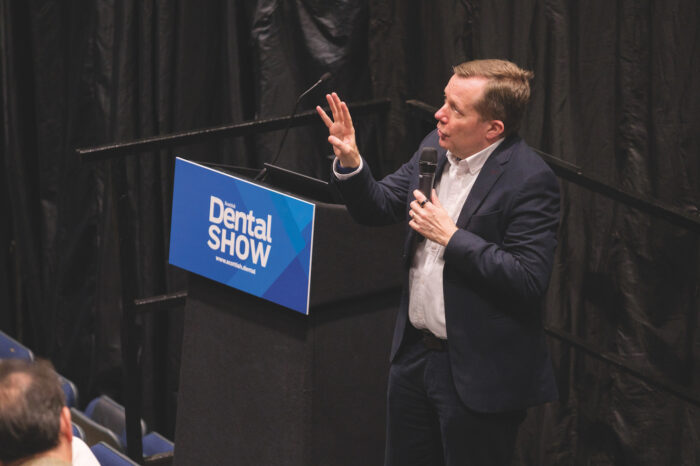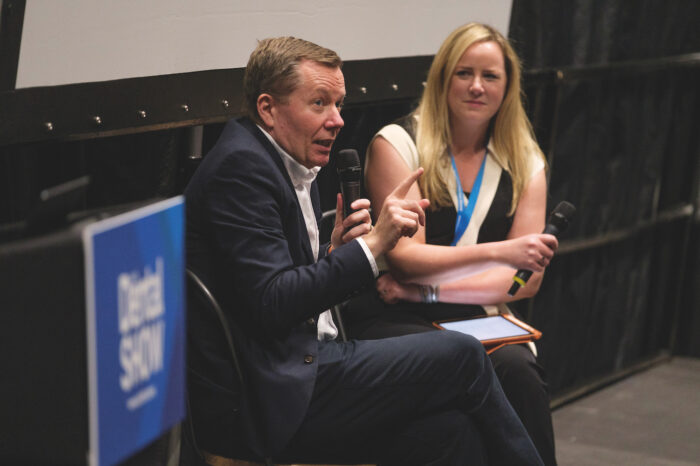What a show!
More than 140 exhibitors and 60-plus presentations from 50 speakers – it’s Scotland’s leading dental profession event
More than 1,800 people attended the 2023 Scottish Dental Show, which featured a packed programme of lectures and workshops as well as more than 140 exhibitors showcasing the latest in dental technology, supplies and services.
“It was great to see so many familiar – and new – faces from the profession and the industry,” said Ann Craib, advertising sales and events manager. “There was a tremendous buzz across both days. I’d like to thank all the exhibitors for helping make the show such a success – and the team behind it for all the hard work in staging Scotland’s premier dental event.”
Will Peakin, editor of Scottish Dental magazine, added: “I think it makes a real difference for the profession and the industry meeting in person – people are able to make connections and exchange insights in a way that’s just not possible online. A big thank you to our more than 50 speakers who gave their time and knowledge to deliver 60-plus lectures and workshops.”
The show was sponsored by Align Technology, Clyde Munro, Medimatch Dental Laboratory, Real Good Dental and Atelier Dentistry. The Education Programme included all eight GDC Recommended and Highly Recommended topics, 22 clinical expertise sessions, 10 on business and finance, a stream dedicated to dental nurses, therapists and hygienists as well as talks on regulation, wellbeing and the future of dental education.
One of the many highlights of the show was the session featuring Jason Leitch, Scotland’s National Clinical Director, hosted by Kim McAllister, the BBC presenter and a consultant with Connect, publishers of Scottish Dental.
Before taking questions from Kim and the audience, Professor Leitch spoke about his experience of the pandemic, both personally and at a Scottish Government level. It included his team dealing with physical mail that was both threatening (a facemask sprinkled with white powder) and uplifting (an oil painting depicting the pictures that television viewers would see behind him on the wall when he spoke to the nation from his dining room).

Another correspondent wrote to highlight his grammatical errors when speaking (Professor Leitch’s wife, an English teacher, concurred). Then there was the self-styled King of Shetland who contended that any edict of the Scottish Government did not apply to the islands.
Professor Leitch went on to outline his experience – and that of his colleagues – at a Scottish Government level. He detailed how they faced the pandemic according to the “four harms” that it caused: to public health, to the health and care system, to social wellbeing and to the economy. His role, and that of his colleagues, was to outline to ministers both the positive and negative effects of the different actions that could be taken to mitigate these harms.
“And, all the time, you are dealing with partial knowledge,” he said. “I say all this, not for you to feel sorry for me, for Nicola Sturgeon, Boris Johnson or anyone else involved in making those choices – I do it to illustrate the complexity of what we were facing every single day, in those rooms at eight o’clock when we were making the choices, giving the advice and then having to go on TV to try and describe it to the population.”
Responding to a question from Kim McAllister, the National Clinical Director reflected on whether – based on the knowledge they had at the time – their decisions might have been different: “This answer is no, not on the big choices, not with the knowledge we had at the time.” The ‘big choices’, as he described them, were the transfer of elderly patients out of hospital into care homes and the closure of schools – both of which have become the subject of global debate.
In fact, Professor Leitch said, he believed that the single toughest choice they made was to stop screening for cancer.
But, regarding the transfer of patients and the closure of schools he said that – knowing what we know now – those decisions were “worthy of investigation”. He added: “In hindsight, I don’t know if they were right or wrong. Regarding schools, the evidence would seem to point to children, unless immunocompromised, not being as adversely affected by the disease as the rest of the population and
that schools – as an environment – are pretty good at protecting against viruses.
“The issue with discharge to care homes is complex and I am sure the public inquiry will spend a good deal of time on this – but, you have to remember what we were facing at the time; a virus that had reached northern Italy where people were lying in corridors outside intensive care units because there were not enough beds.
“So, we knew we needed extra beds. We had around 1,500 people in hospital who were fit enough to be discharged – some to care homes. We tested as much as we could, but we didn’t know at the time about asymptomatic spread. So, there wasn’t one door leading to a good path and another leading to a bad; there were only two bad paths.
“We gave the advice that we thought was right at the time, which was to free up beds so that seriously ill people could be treated and their lives saved. I still think that decision was right and somebody else will have to judge whether we could have done it differently.”

Professor Leitch was asked about the impact making these decisions had on him personally and he said that, at the time, “you had to compartmentalise it”. It was, he said, what health workers must do every day. He recalled visiting the infectious diseases unit at Monklands Hospital where they had not had a death in three years; the week of his visit there had been 19.
Just recently, he added, he met an intensive care nurse: “She is one of those people born to be an intensive care nurse; she had seen everything. I asked her: ‘How was COVID for you?’ – because I hadn’t seen her since – and she just cried, instantaneously. She told me how five of her patients had died in four hours.
“And, obviously, it is not just her who is affected; there are the other staff who looked after them, then there’s the porters and the mortuary staff and the rest. So, dealing with that on a daily basis – while being buffeted by industry who are asking: ‘Why do I have to shut?’ – and trying to give the right advice to ministers, is the challenge.”
The questions then turned to the dental profession and Professor Leitch said he thought it had responded “magnificently”, citing the rapid establishment of the urgent dental care centres and dental professionals’ involvement in the vaccination programme.
The suspension of everyday care had clearly created a treatment backlog which needs to be worked through, he said. He added: “I fear we also have an invisible backlog from a lack of preventative care; people we haven’t seen and had check-ups. It’s not unique to dentistry; it’s true in a range of disciplines. It’s going to take a lot from the profession, from government and funders to get through that.”
Kim McAllister asked about the work that had begun before the pandemic to create a new model of care: “Philosophically, that has not stalled,” said Professor Leitch. “The trick is to find a formula, a funding mechanism, that will reward people doing it for a living and that doesn’t result in either over-treatment or under-treatment. If you pay ‘per widget’, the danger is that you get too many widgets. If you pay for just caring, you don’t get any widgets.”
Professor Leitch alluded to the formula which applies to general practitioners (GPs) where they receive a block of funding for caring for a geographically defined population, to keep them healthy, but are also paid for specific kinds of care; prescribing or cervical screening, for example. “I don’t think anyone, worldwide, has – unless somebody can tell me otherwise – found that magic formula for dentistry,” he said.
Taking questions from the audience, Professor Leitch was asked about one potential widget; a payment for oral cancer screening of NHS patients – who would not have to be registered with a practice to undergo the process – with the questioner adding: “I’m terrified of all the patients we have not seen and I think payment for occasional oral cancer screening would make a world of difference.”
The National Clinical Director responded: “Your fundamental point is correct; that in the present climate we can’t do all the treatments that a cohort requires so we should prioritise what is required – and that might be cancer screening. I’m just not sure your route to it is entirely correct; a system of payment could be open to abuse.”
Later, Professor Leitch heard from an audience member, a former dental nurse now working in palliative care who, last year, had not experienced anyone with oral cancer but “now, it’s only May and I’m on my ninth patient.” She described the pain they experienced and the challenge in maintaining their oral health at end of life.
Professor Leitch said he had experience of palliative care, from his time working as a consultant oral surgeon, and of the importance of the profession “making yourself prominent in those environments, available to end-of-life care teams, that you got to hospices – these are crucial parts of our healthcare system and dentistry, in its broadest sense, can provide these valuable services.”
Charlotte Waite, Director of the BDA in Scotland, asked Professor Leitch: “Looking to the future, what is the single most important lesson that has been learned which would be of most benefit to dental teams?”
He responded: “I hope it’s the importance, at every level, of the dental profession to the health of the nation. Dentistry stepped up; we’ve talked about the urgent care centres but also, remember the country was vaccinated with the help of the dental profession.
“It’s our job to make sure that [recognition] is maintained. That gives you currency at the BDA to have conversations in the key rooms where you can say the dental profession is not just widgets; it’s cancer, it’s the health of the nation in the bigger picture. I hope that’s the biggest thing we have learned.”
He added: “More of the profession should be in some of the key healthcare jobs, not just advocating for the profession but for the health of the nation with their knowledge of, and insight into, the links between oral health and general health.”
Lynn Hood, the recently appointed chief executive of the Scottish Dental Care Group, asked how Scotland could position itself as the first-choice destination for dental professionals and how the barriers to them working here could be overcome.
Professor Leitch said that a previous workforce challenge had been met with financial resources to attract overseas workers which, today, are not available. He said that if there were bureaucratic hurdles then, yes, those should be removed but he also cautioned about attempting to “poach” workers from other countries who could not afford to lose them.
Ms Hood said that one issue was health boards recruiting separately and that there should be a more joined-up approach, to which Professor Leitch said it would be useful for her to have a conversation with the Scottish Government’s recently appointed Director of People.

Comments are closed here.